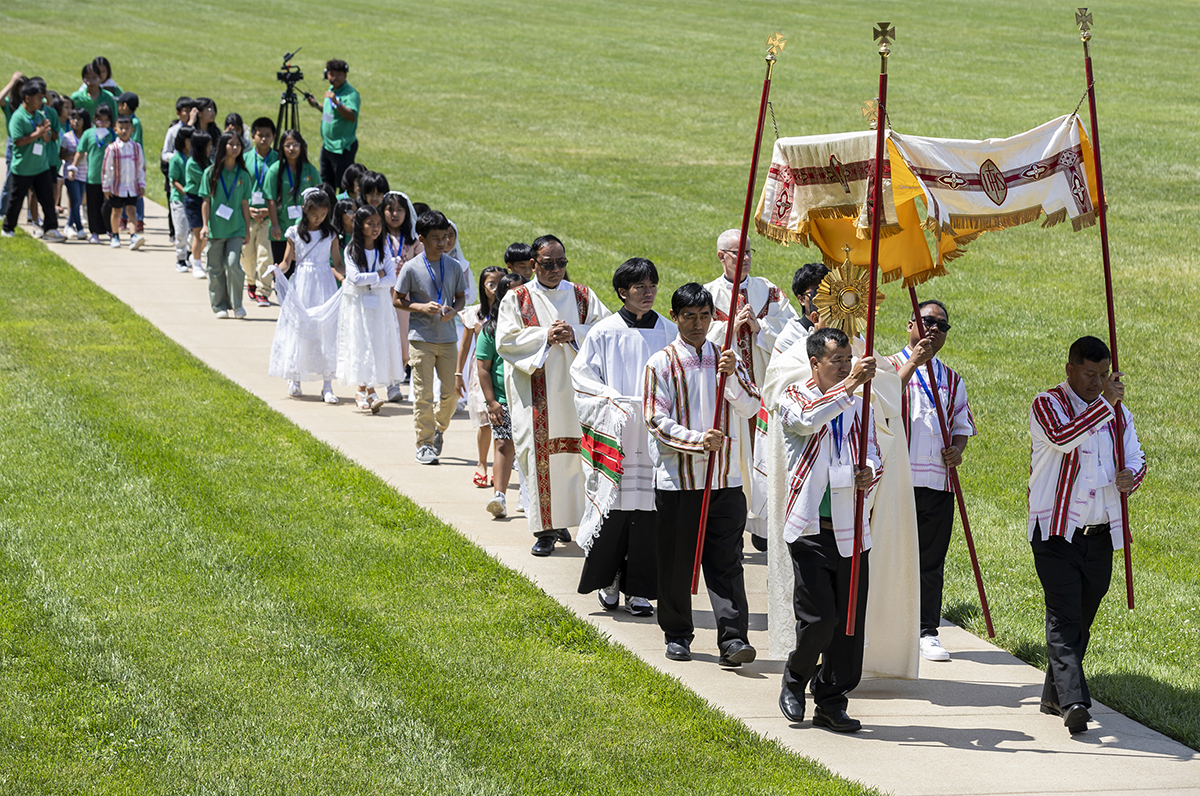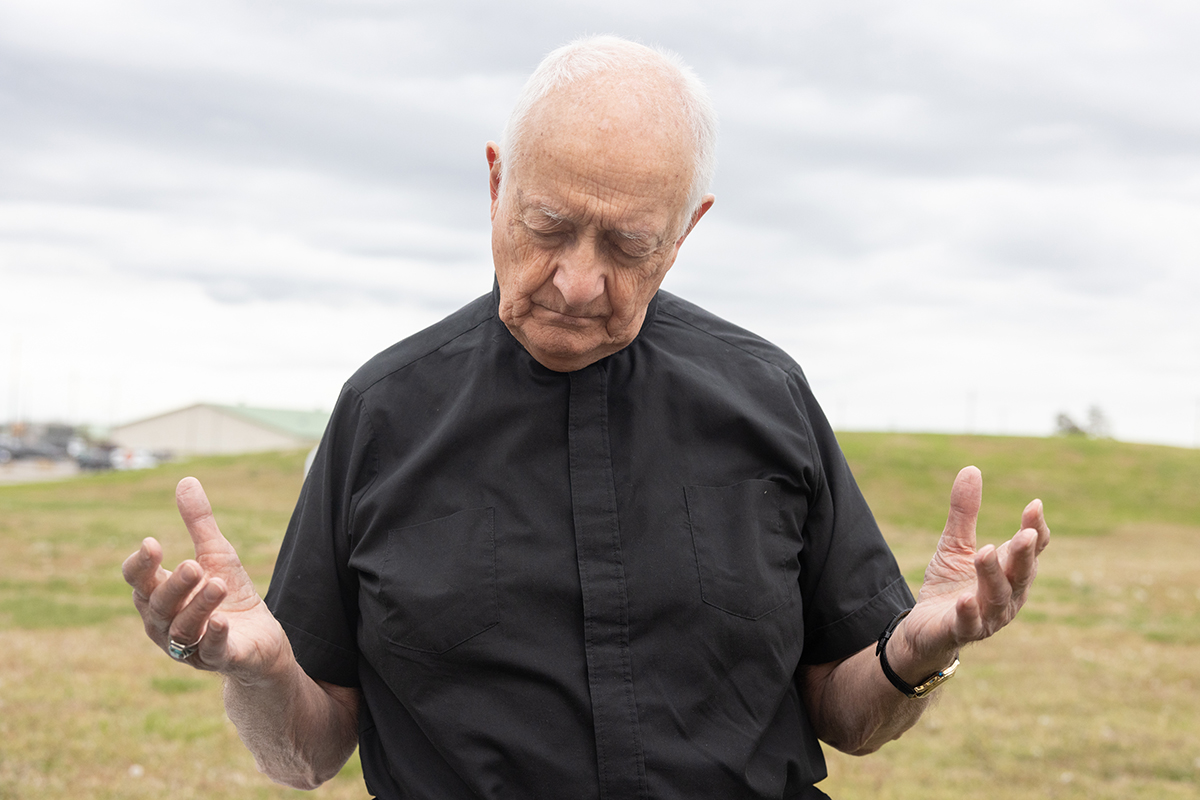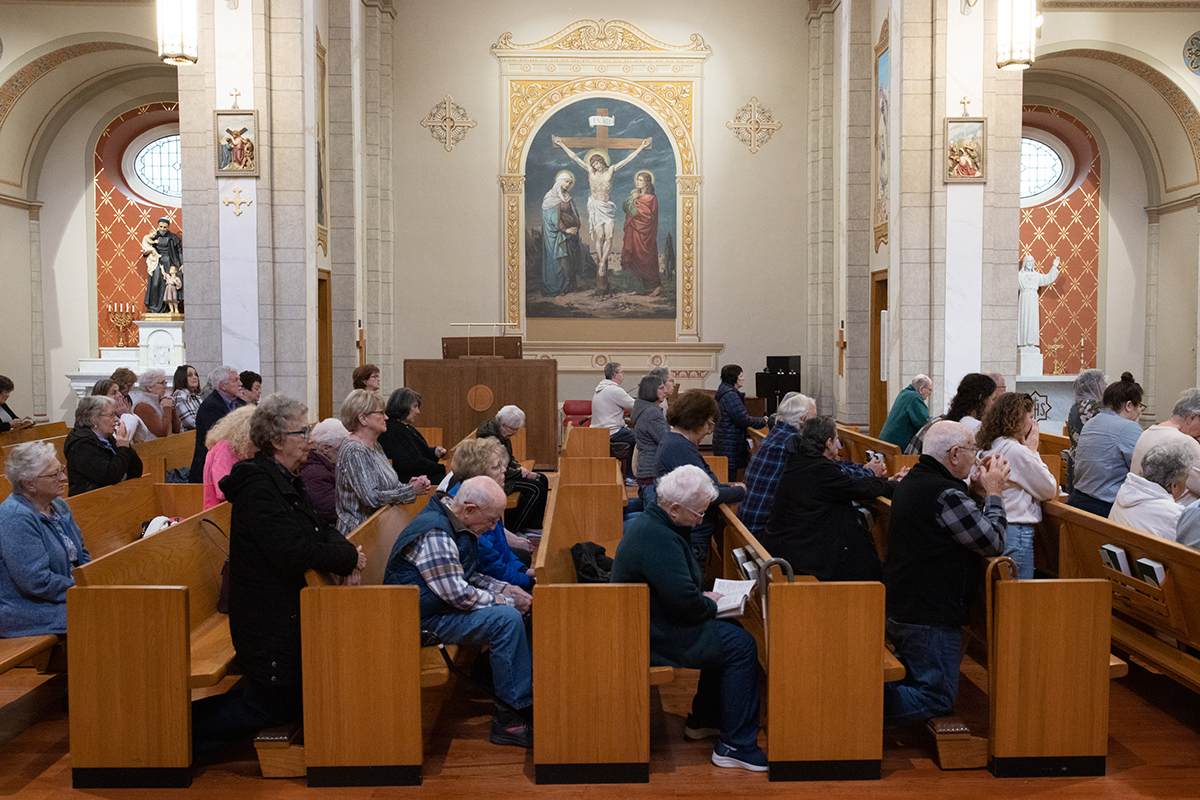St. Charles parishioners grateful for event on racism
Visitors tell heartfelt stories of harm from subtleties, insensitivies of racism
Many people stayed late after the presentation at a suburban parish in St. Charles County, asking questions of and socializing with a group of seven African-American parishioners from St. Elizabeth Mother of John the Baptist Parish in north St. Louis. They waited in short lines late on a weekday evening before getting a chance to meet their visitors.
Parishioners were invited from throughout the St. Charles Deanery, an area that Census figures show has an African American population of less than 5 percent. Msgr. James P. Callahan, pastor of St. Joseph Parish in Cottleville, said the aim in holding “A Dialogue/Conversation on the Subtleties and Insensitivities of Racism” was for it to be a positive learning experience about how racism still permeates society.
That was the result, according to several attendees from St. Charles. “I was so grateful they spoke from their hearts,” Jo Eisele of Immaculate Conception Parish in Dardenne Prairie said of the stories told by the panel of seven people from St. Elizabeth Mother of John the Baptist Parish’s Social Justice Committee and their parish pastor, Father Steve Giljum. “It’s something we’ve needed to hear in the Church” to overcome prejudice and fear of people who are of another race, Eisele said.
Richard Middeke of St. Joseph Parish called the presentation eye-opening. Racism is a problem even within the faith, one that he is working on himself and is seeking “what we can do as a Church to eliminate it,” he said.
Seen as less than
Alfreda Pulley, a St. Elizabeth parishioner who has a pharmacy degree and a master’s degree in business administration, said in her presentation that “no matter what the setting, people are surprised I’m the pharmacist.”
A recipient of a distinguished alumni award from the St. Louis College of Pharmacy, she’s now a pharmacist for CareSTLHealth where she is responsible for ensuring that the organization adheres to federal regulations. Pulley also manages inventory control and performs medication therapy management and services for patients. On a service trip to El Salvador, she helped provide care for more than 3,000 people who didn’t have access to regular heath care.
Pulley told of working as a retail pharmacist where customers often assumed she was an assistant. She’s even heard customers say, “I’d rather talk to that person,” pointing to a white colleague.
Other times, she was told, “I’m surprised you caught on so fast.” It reinforces that “we’re seen as less because of the color of our skin,” Pulley said.
Pulley and her husband, Kevin, have two adult daughters who left for opportunities outside St Louis, telling their parents that this city is too racially divided. A third daughter plans to do the same, Pulley said.
Her faith has helped her understand “I am God’s beloved daughter. And I am always good enough in His eyes,” she said to applause.
Her husband, Kevin, a schoolteacher, told of the need for African-American parents to detail to their children how to behave when stopped by police. St. Louis is losing a lot of talent because young African Americans are leaving for other cities that offer better opportunities and less racial strife, he said.
Chipping away
The other panelists also told of how their skin color made a difference in how they have been treated.
Anita Williams, parish nurse at St. Elizabeth, told of moving to a neighborhood in St. Peters in 2002 where neighbors are unfriendly. She’s the only African American in the neighborhood, she said. “I have to make the first gesture to speak to them,” Williams said.
Brenda Vanderford described moving into a subdivision in north St. Louis County years ago and being told that the parish school had a three-year waiting list, yet her white neighbors had just moved in and had no problem enrolling their children. She also told of being passed over for job promotions.
“The racial divide is big, but nothing is too big for God,” she said. “With the help and support of each other coming together as we have come together tonight, we can chip away at it, one day at a time, one mile at a time, one friendship at a time, one child at a time.”
She wants to see her children, grandchildren and great-children to see a world where there is no color, no hurt and no hate. “We can conquer the lies of racism,” she said.
Stephen Byes, a broadcaster who’s worked at a number of radio stations in St. Louis since 1978 and does professional narration, said he thought America would be beyond racism by now. “Maybe the millennials will forget about racism. That would be nice, but right now it still exists,” he said.
He ended his talk expressing a hope that what he said about his experiences would change mindsets. Later, Msgr. Callahan told the gathering that “we are brothers and sisters, no matter what our race is, no matter what our color is, no matter what our background is.”
‘Love matters’
Dorothy Dempsey said that when people mistreat or ignore others because of their race, “How can we call ourselves children of God and allow it to to continue?”
Dempsey cited politicians who play up racial fears, people who pass racial hatred on to their children, the need for better training for clergy in African-American parishes, a lack of positive media portrayals of people of color even in Catholic publications and the urgency to address racism.
“Why does racism seem so low on the totem pole of the Catholic Church? Racism’s history is ingrained as deeply as abortion,” Dempsey said. “All lives matter. Love matters.”
>> Archbishop’s statements
A year ago, Archbishop Robert J. Carlson invited clergy to preach about racism during Masses the first Sunday in Lent. Read more at bit.ly/2SuUx3t
“I realize racism expresses itself in many different ways and when many hear the word they immediately think of policies, institutions, laws, and language,” Archbishop Carlson wrote.
A 2018 report from the NAACP funded by Wells Fargo notes that with a dissimilarity index above 70, the St. Louis metropolitan area has an extremely high level of segregation. The home ownership rate of 75.8 percent and the median home value of $175,800 for whites in the city is almost double that of its black residents at 40 percent and $90,100 respectively.
“During the 1960s we made many laws as a nation against racism, and some things changed,” Archbishop Carlson stated. “But we never took the time, as a people, to really talk to one another about this issue, and a deep divide has remained. All people, regardless of race, should be treated with dignity and respect. All children, no matter where they reside, should feel safe in their environment and should benefit from quality education without having to travel out of their neighborhood to receive this benefit. We must do better.”
Archbishop Carlson addressed the topic several times previously. In 2017, a statement from the archdiocese pointed out that racism, or any ideology which seeks to undermine the dignity and worth of human beings simply because of the color of their skin, must be condemned. In 2014, in the midst of the protests in Ferguson, he said our nation must deal with the sin of racism, calling it contrary to human dignity.
As chair of the Cabinet of the Interfaith Partnership of St. Louis, he co-wrote a statement calling for lasting solutions and work toward dismantling systemic racism.
In 2018, the U.S. bishops wrote a pastoral letter on racism, “The Enduring Call to Love: A Pastoral Letter Against Racism,” conveying grave concern about the rise of racist attitudes in society and offering practical suggestions for individuals, families and communities.
>> Pastoral letter
The U.S. bishops approved a pastoral letter, “The Enduring Call to Love: A Pastoral Letter Against Racism,” Nov. 14 conveying grave concern about the rise of racist attitudes in society and offering practical suggestions for individuals, families and communities.
More than two dozen Catholics shared their personal experiences of racism within the Catholic Church as part of a listening session Aug. 17 at Saint Louis University that was part of the preparations for the pastoral letter. The Archdiocese of St. Louis was the first diocese to host a listening session in conjunction with the United States Conference of Catholic Bishops’ ad hoc Committee Against Racism. The bishops hosted the sessions with dioceses to hear firsthand from Catholics who have been harmed by acts of racism and to pray for healing, forgiveness and reconciliation.
Bishop Sheldon T. Fabre of Houma-Thibodaux, La., who chaired the committee, said following the pastoral’s approval that “every racist act — every such comment, every joke, every disparaging look as a reaction to the color of skin, ethnicity or place of origin — is a failure to acknowledge another person as a brother or sister, created in the image of God.”
>> Resources
The United States Conference of Catholic Bishops’ website includes information on the ad hoc Committee Against Racism, including statements and other communication from the Church and bishops, prayers and liturgy resources, teaching resources and more: bit.ly/2bRijUK
The Peace and Justice Commission of the Archdiocese of St. Louis: www.archstl.org/ peace-and-justice-commission
Many people stayed late after the presentation at a suburban parish in St. Charles County, asking questions of and socializing with a group of seven African-American parishioners from St. Elizabeth … St. Charles parishioners grateful for event on racism
Subscribe to Read All St. Louis Review Stories
All readers receive 5 stories to read free per month. After that, readers will need to be logged in.
If you are currently receive the St. Louis Review at your home or office, please send your name and address (and subscriber id if you know it) to subscriptions@stlouisreview.com to get your login information.
If you are not currently a subscriber to the St. Louis Review, please contact subscriptions@stlouisreview.com for information on how to subscribe.






